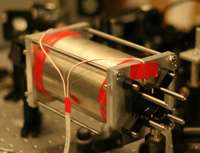Unique Heart Beat Signature Device Could Revolutionise Healthcare

An innovative cardiac scanner will dramatically improve the process of diagnosing heart conditions.
The portable magnetometer* is being developed at the University of Leeds, with funding from the Engineering and Physical Sciences Research Council (EPSRC) playing a key role.
Due to its unprecedented sensitivity to magnetic fluctuations the device will be able to detect a number of conditions, including heart problems in foetuses, earlier than currently available diagnostic techniques such as ultrasound, ECG (electrocardiogram) and existing cardiac magnetometers. It will also be smaller, simpler to operate, able to gather more information and significantly cheaper than other devices currently available.
Another key benefit is that, for the first time, skilled nurses as well as doctors will be able to carry out heart scans, helping to relieve pressure on hospital waiting lists. The device will also function through clothes, cutting the time needed to perform scans and removing the need for patients to undress for an examination. It could also be taken out to a patient's home, leading to a reduction in the use of hospital facilities.
Large scale magnetometers have been used for some time for things like directional drilling for oil and gas, on spacecraft for planet exploration and to detect archaeological sites and locate other buried or submerged objects. What has prevented them being used for identifying heart conditions is their size and high cost along with the specialist skill needed to operate them. Using them to examine a patient would involve containing the person within a magnetic shield to cut out other electrical interference.
"The new system gets round previous difficulties by putting the actual detector in its own magnetic shield," said Professor Ben Varcoe who is leading the research team.
"The sensor placed over the area being examined lives outside the shielded area and transmits signals into the detector. The sensor head is made up of a series of coils that cancel out unwanted signals and amplifies the signals that are needed. So the tiny magnetic fields produced by a person's heart can be transmitted into the heavily shielded environment. What we've been able to do is combine existing technology from the areas of atomic physics and medical physics in a completely unique way."
Like all parts of the body, the heart produces its own distinctive magnetic 'signature'. The research team has demonstrated that their magnetometer - developed as part of their work in the area of quantum physics - can reveal tiny variations in that signature. Studying these variations can, in turn, reveal the presence of a cardiac condition. The team is now working on miniaturising the magnetometer for widespread medical use. The device could be ready for use in routine diagnosis in around three years.
"Early detection of heart conditions improves the prospects for successful treatment. This system will also quickly identify people who need immediate treatment," says Professor Varcoe. "But our device won't just benefit patients - it will also help ease the strain on healthcare resources and hospital waiting lists."
The device is expected to be particularly effective at detecting ischaemia, a condition where blood supply to an area of the body becomes inadequate due to a blockage of the blood vessels. It could also shorten surgical procedures for people suffering from arrhythmia - a very common condition where the patient has an irregular heartbeat. Currently, the condition is corrected by surgery which can last several hours. Much of the time is spent trying to identify which heart node needs to be cauterised. Scanning the heart with the new device during the operation would offer a much quicker way of pinpointing the correct node, reducing the length of the whole procedure by 80%.
The team working on the magnetometer has included specialists in electronics, precision measurement and optical fibre technology, as well as physicists. The instrument also has potential to be adapted to detect abnormalities in other organs, such as the brain.



















